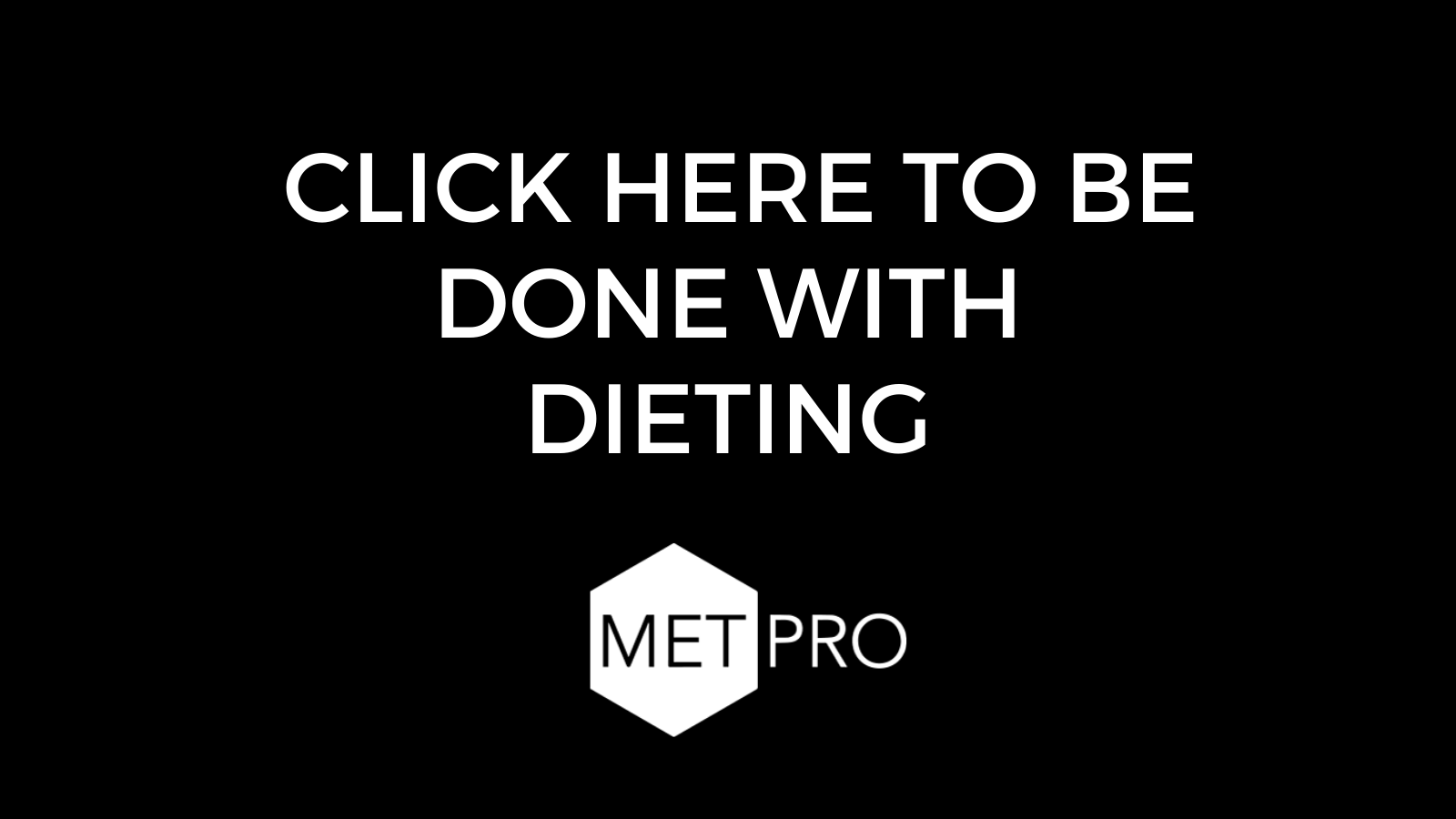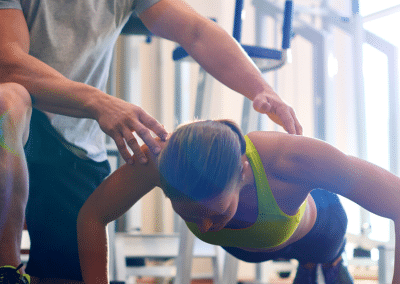I am joined by MetPro coach Eric Wilson, and we will be discussing how to handle peer pressure while you're working on your fitness and nutrition goals. Eric, thank you so much for joining me.
You're welcome. Thanks. Nice to be here.
It's nice to have you here. This is something I get asked all the time. I have had people and clients say to me, I’m going out to dinner, but I don’t want to explain why I’m eating differently than them, or I’m going to a work party, and I don’t want to explain why I’m not drinking.
Would you consider these interactions peer pressure? Is there a better way to describe it? What would you call it?
I was thinking about this. Peer pressure to me, is when somebody wants you to do something with food that you don't necessarily want to do. What would the root of that be? To me, they're looking for permission to do something, and if they can get you to do it too, it must be okay. If I want to eat a piece of chocolate cake but I'm feeling guilty, if I can get you to eat a piece with me, it doesn't feel so bad.
Having said that, though, if it's about other people's behaviors, not so much about your behavior, but they're questioning you, then why do you think our natural response is that we owe an explanation?
The goal would be that we're looking to fit in. If we stand out because we're doing something than everyone else, that problems people. Most people don't want to stand out. They want to fit in. If I'm the one that's doing different and is looking at me going, What’s that guy doing?
I'd rather be going along with the flow and not be standing out as like, How come this guy busted out a food scale, and he’s measuring his rice over here at the table?
I've had clients that have told me, I brought my food scale to a restaurant.
I'm like, Don’t do that again. I don’t want you to be like that. I want you to be aware, and I want you to have measured things at home, so when you go there, you’ll know what a portion size looks like without having to measure it, or you’ll be close enough for government work,
I'll call it.
We want people to have the tools, not necessarily whip the tools out every day but like mentally be able to use them anytime. If it feels rude or you feel like, I want to fit in. That’s the reason.
How should you handle it? What is the answer there, then?
The answer to me is 1 or 2 things. It's identifying what it is you're going to and what's your comfort level with the people there. Two examples. I'm going to a family barbecue at my brother's house and it's going to be all my family there. They all know where I work. They know what I do. They've all been around me long enough to know that I pack a snack with me wherever we go. They've probably eaten some of my snacks.
That being said, I'm not going to try to do anything outside of what I normally do because there's no expectation or no standing out by me being me. Otherwise, they wouldn't have invited me. I'm not going to guilt trip anyone to do anything that they don't normally do. In the same sense, when I show up with the vegetable tray because I know there are not enough veggies there. I'm the one that is looking through and saying, I’d rather eat the sweet potato and the macaroni and cheese over there.
They're not going to be surprised. That's what I do. What if just got a new job and now I'm going to be at a function with my new coworkers? They don't know me and I don't want to be this crazy guy on the first day that's food scaling his food while we're all there.
They're like, Who’s this?
That strategy is completely different for me. What I probably would do first is I'm probably going to look at the menu of where I'm going in advance and get an idea of what types of foods they have. That way, when I show up there, I probably have a game plan already. If I look over the menu and I find out it's a pizza place we're going to. All my choices are pizza, French fries and macaroni and cheese.
When I get to this event, then I'm going to have to decide how I am going to handle it. I don't want to eat pizza because I've been doing good on my eating. I don't want to blow it. I've got a new low going on the scale. Everything's lined up. I've made the decision I want to go to this event, but I don't want to eat pizza, but I don't want to stand out. Here's what I'm going to do. In my car on the way there or before I leave the house, I'm going to eat my entire on-plan dinner minus the vegetables. When I show up at the pizza place, I'm going to order a salad bar. I'm going to go over and I'm going to go build out a big salad that is pretty much vegetables.
I'm not going to throw croutons on it or avocado or ranch dressing or anything. I'm looking for maybe no dressing. Maybe a light balsamic dressing, depending on where I'm at. I might have my own dressing. It depends on the formality of the place. Think about that. I order this salad and I'm going to proclaim. I'm going to sit down with everybody and I'm going to say, I had a workout earlier that got me so hungry. I had to eat dinner already, but I’m still hungry, so I’m going to eat this salad with you guys too. I hope you don’t mind.
Right there, I explained my action and why I was not eating what they ate. There's no guilt in anyone for eating anything they're eating and who hasn't been in that situation before where you were so hungry, you had to eat, but you still want to be social? This allows me to check all the boxes but not have to eat that food in that scenario, assuming I didn't want to.
What if you're going to a situation where there is no salad bar? It is a situation where there is no good food. Maybe it was a work event, so you didn't have time to eat your whole meal. What do you do in that case?
I'm probably going to eat some and eat the rest either on my way there or on my way home. It's going to be an extremely rare situation that I wouldn't eat at all. I would have to be not feeling well, or it was the food I had an allergy to or something like that. I'm never going to say, No, I’m not eating,
but I'm going to pick. Let's say we're going to that pizza place and I know they don't have a salad bar. They don't have anything other than pizza, macaroni and cheese and French fries. When I get there, what I'm going to do is I'm going to eat one very small slice of pizza.
On my way there, I likely would have eaten my protein. Probably tried to have eaten a carb. What if I could get down some beef jerky and an apple on my way there? When I show up, I've got protein, fat and a carbohydrate already created macronutrient balanced by eating protein, fat and carb on my way there. Now I have this little slice of pizza and I'm trying to hope it's a vegetable slice of pizza if I can. If the pizza is already ordered and that's what's there, I'm picking the least of the evils. I'm looking for something with more veggies and less refined meats on it. I'd rather have a thin crust over a thick crust. I'd have red sauce on it than a white sauce or pesto on it.
I'm going to eat that one small slice, then I'm probably going to say something after I eat one slice, like, I’m full, sorry. I already had to eat earlier again because,
and I'm going to use my excuse of some exercise or being super hungry. Anyone that knows me knows that I probably was exercising and I am always hungry. Both of those aren't excuses. They're true.
That holds true for a lot of other people too. In that case, you're not even making up an excuse, but worst-case scenario, I still ate that little slice of pizza. That way, I didn't stand out. I got a little bit of a treat. I ate on-plan right before leading up to it and guess what? As soon as that meal is over, my very next meal, whatever it be, is going to be back on plan again.
Here's the steadfast rule that I tell people to remember. That is that no one meal is ever going to undo all your hard work. I still created stable blood sugars by having my protein, fat and carbs. I added some extra protein, fat and carbs with the pizza. I was on plan up into it and I'm going to be on plan right after it. My body will find stability pretty quickly.
That is who you are. What if you're a person who's shifting completely? Never been a person who's exercised and all of a sudden, you're exercising. You've always had eight drinks when you go out and now you're like, I’m not drinking.
How do you handle that with people? I know I'm putting you on the spot a lot, Eric.
I know this. I spent a long time working in a hospital and some of working in the hospital was learning about behavior change because what ends you up in the hospital is usually something catastrophic that makes you think twice about changing your behavior or you might be there again. Some of it is, do you want your behaviors to change? If you do, you need to tell other people, so they will hold you accountable.
Now that doesn't mean you have to tell people that will make you feel bad. Maybe you don't tell your coworker because they eat cheesecake every day at lunch. You don't want them to feel bad about eating their cheesecake when you're sitting there next to them eating your veggie plate, but at the same sense, if that coworker's always offering you cheesecake and you're constantly saying no. Maybe at some point, tell him, I’m working on and I’m cutting things down and it’s nothing to do with you. It’s that I’ve got this personal goal of mine now.
Again, I never try to make anyone feel like anything they're doing is wrong, but I'm happy to tell them what I'm doing and why.
I'm leading by example a little. Sometimes people will see the things I'm eating and say to me like, Where did you come up with that?
I'm like, Here’s where I came up with.
It elicits a conversation that they weren't necessarily curious, like why I was eating so healthy. They were curious like, How did that come about?
What if it's the type of conversation where they're like, Eric, you’re already thin? You’re already in good shape. You don’t need to lose weight. Why are you doing this? It’s only one cookie. It’s only one drink. What’s the problem?
How do you handle something like that?
For me, it's not necessarily about body image, what we see or if I look at you, what I see doesn't tell me how healthy you are. I worked with tons of people over the years, thousands of people in the hospital that if you looked at them on the outside, they were the picture of health, but they were a mess inside and vice versa. People that looked extremely unhealthy outside, but they go and do a cardiac stress test and they get the heart of an 18-year-old at 50. These things happen.
For me, some of it is remembering that it's the big picture of what's going on inside of us that we're working on. I happened to have had a father who died of heart disease. For me, it's easy to make choices toward foods that don't encourage heart disease because that risk factor's in my family. I'm probably avoiding eating lots of things that are super high in saturated fat because I don't want to end up like my father because I know that's one of the risk factors.
Reframing not only how you think of it but how you're explaining it to other people. It's probably a good time to remember that people aren't thinking so much about who we are as a person. They might be noticing something about you, but they're not necessarily judging you in the same way you're critical yourself.
Seldom, are they?
My husband says all the time, and I know it's a famous quote, but, like, You wouldn’t think so much about it if you realized how little people think about you.
It's so true, but we're all guilty of that. I have a story. A guy told me, I don’t want to drink water on my airplane ride.
I said, You’ll be dehydrated then.
I don’t want to use that bathroom. I don’t want people to stare at me.
In return, I asked him, Do you think one person is going to get off that plane and go, ‘Do you remember that guy with the black suit on who got up and used a bathroom two times?’ Even if they did, are they ever going to see you again and does it matter?
There is that.
There's also that food is healing. It's remembering things, an example of a blueberry and a DNA switch. I read a study again that talked about blueberries and their anti-cancer properties and how they keep doing study after study that saying that people that consume high amounts of blueberries don't get cancer nearly as often as people who don't eat blueberries. It's like, If they’ve been studying this for 40 years and it continues to hold true, I’m putting blueberries in my diet because I don’t want cancer. It seems like it’s going help.
It's those types of things too. Are you choosing foods you know are good for your body because without our body and health, we're not going far?
Eric, is there anything else? As we wind down, people should be thinking about when it comes to these type of conversations or times where they might feel awkward and want to take care of themselves.
I think sometimes we feel guilty for taking care of ourselves when human nature is to help other people. A good example of that is, again, going back to one of my past jobs. A whole bunch of registered nurses is all overweight because they'll tell you, I don’t take breaks because I got to help my patients out.
They care so much about the people they're helping and it's a personality trait. It's a nice personality trait. You care so much about others, but you're willing to sacrifice yourself. At some point, you need to take a step back and realize that if you don't take care of yourself, how will you ever take care of others?
It goes both ways. If I want to be here, later on, to see my daughter have kids, then I have to take care of me. If I want to make sure that if my wife falls down and gets hurt, I can help her out. I get to take care of me. It's the grand picture also of what else do we want to accomplish and how are we going to see that happen.
Eric, thank you so much for your time. I appreciate it. Readers, that is all for this episode. You can find episodes of the MetPro method anywhere that you get podcasts or you can go to MetPro.co/podcast. Please be sure to follow the show and rate and review because that lets other people know what to expect. You can also learn more about MetPro at MetPro.co. I'll be back in the next episode. Until then, remember, consistency is key.






